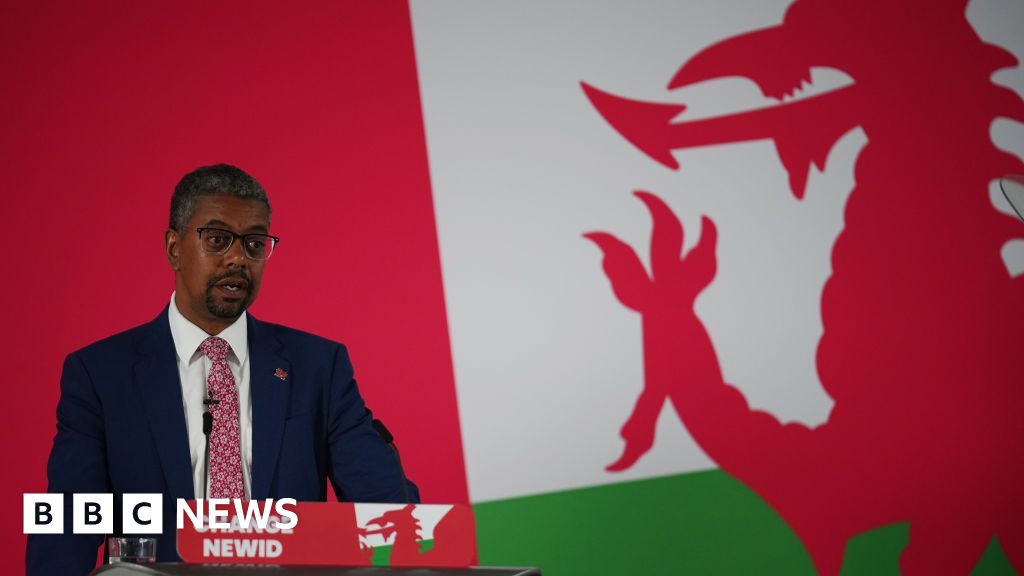Key events
Filters BETA
Barrister Hashi Mohamed has written for the Guardian about what Sunak’s victory means for progressive politics.
Congratulations to Rishi Sunak on becoming the first Asian prime minister of the UK. It’s a momentous day for a number of reasons, not least because the Conservative leadership race was a shining example of that old immigrant adage: you have to work twice as hard to achieve your goals.
On his second opportunity to become the leader of the Conservative party, all it took for Sunak to win was Liz Truss tanking the economy, global markets in turmoil and the threat of Boris Johnson returning as leader. The race showed that not only did Sunak have to work much harder than his predecessors for his appointment, but it was already obvious to the whole country in the previous leadership election that he was the only sensible candidate.
Alas, for Tory party members it was still preferable to elect a white woman than a brown man; just as well they won’t be able to vote on his appointment this time.
But rising above these political machinations, what does this moment really tell us about race relations in Britain?
For people like us, Sunak’s ascension is tinged with bitterness – for many, his hardline views aren’t exactly representative of who we imagined would be the first British leader with immigrant parents.
More now on who Britain’s new (unelected) PM is.
Sunak has gone from MP to prime minister in just seven years – faster than any other PM in the modern era. David Cameron achieved the same in nine years, but again, Pitt the Younger holds the overall record with just two years.
The path to the top wasn’t all smooth. After losing to Liz Truss in a vote of Tory members on 5 September, he was expected to disappear from politics – and quickly did, last speaking in the Commons the day after Truss became PM. But when Truss’s disastrous and unfunded tax cuts brought her down in flames, Sunak was ready with the backing of supporters he had gathered over the summer campaign.
After winning the leadership, Sunak, whose career has been defined by fiscal conservatism, told MPs his ambition was to have a “highly productive UK economy” and that he backed low taxation but that it had to be affordable and deliverable.
Labour says general election ‘looks less likely’
Pat McFadden, the shadow chief secretary to the Treasury, has acknowledged the prospect of a general election “looks less likely”.
The party has been calling for the question to be put back to the country as the Tories have changed their leader twice since they won a mandate to lead in 2019.
But Mr McFadden says Rishi Sunak, who will be appointed prime minister on Tuesday, appears to have “ruled it out”.
He told BBC Breakfast: “Given the parliamentary arithmetic – the Conservative party has got a big majority – the only way a general election can happen, really, is if they agree to hold one. So, that looks less likely today.”
He said such a vote would be preferable to “a game of musical chairs at the top of the Conservative party”.
Who is Rishi Sunak?
The man who will on Tuesday become the UK’s 57th prime minister is richer than the King and, at 42, younger than every predecessor except William Pitt the Younger.
Sunak will also be the UK’s first ever person of colour to lead the country, and first Hindu prime minister.
On Saturday, this newspaper asked if he was too rich to become PM. On Monday, 195 Conservative MPs answered. So how did he get here?
Youth
Sunak was born in Southampton in 1980 to Indian parents who had moved to the UK from east Africa. His father was a GP and his mother ran her own pharmacy. The eldest of three children, Sunak was educated at a private boarding school, Winchester College, which costs £43,335 a year to attend. He was head boy, and has in recent years made donations of over £100,000 to the school.
Sunak went on to study politics, philosophy and economics at the University of Oxford, like so, so, so many before him. He was awarded a first-class degree. He later gained a masters of business administration (MBA) at Stanford University, where he met Akshata Murty, his future wife, but where few others remember him.
Family
Murty, 42, is the daughter of the Indian billionaire NR Narayana Murthy, often described as the Bill Gates of India, who founded the software company Infosys. According to reports, his daughter has a 0.91% stake in the company, worth about £700m.
The couple married in her home town of Bengaluru in a two-day ceremony in 2009 attended by 1,000 guests. They have two daughters, Krishna and Anoushka. In April this year, it emerged that Murty was a non-domiciled UK resident, meaning she avoided UK taxes on her international earnings in return for paying an annual charge of £30,000.
Without that non-dom status she could have been liable for more than £20m of UK taxes on these windfalls, it was reported. After a public outcry, her spokesperson announced she would start paying UK taxes on her overseas earnings to relieve political pressure on her husband.
Still, Sunak and Murty’s combined fortune is estimated to be £730m, double the estimated £300m-£350m wealth of King Charles III and Camilla, queen consort. They own four properties spread across the world and valued at more than £15m.
Let’s take a moment to appreciate The Star’s front page:
The new PM might herald an end to The Star’s run of excellent front pages of late, but if this one turns out to be their swansong, today’s front page is pretty good as valedictorian addresses go… pic.twitter.com/aqvPpYzHbt
— Alastair Thomson (@FinanceDirCFO) October 25, 2022
Coming up today
If you’re just joining us, I’m Helen Sullivan and I’ll be taking you through the latest for the next few hours. You can find me on Twitter here if you need to.
This is the expected schedule for today’s events:
9am: Liz Truss will chair her final Cabinet.
10.15am: Truss will make a statement outside No 10 Downing Street. Then she will go to Buckingham Palace to offer her resignation to the King. The king will then meet new Conservative leader Rishi Sunak and invite him to form a government.
11.35am: Sunak will make a statement in Downing Street before entering as prime minister. Inside, civil service staff will guide a new team of political appointees through what is known as “onboarding”, involving everything from computer log-ins to security passes. Sunak will also put the finishing touches on his cabinet.
How world leaders are reacting to Sunak’s ‘coronation’
Samantha Lock
News that Rishi Sunak will take office as Britain’s next prime minister – the third in less than two months – raised cheers in New Delhi, calls for stability from Europe and praise as a “groundbreaking milestone” from the US.
World leaders lauded the significance of Sunak’s victory as the UK’s first prime minister of colour and the youngest in modern political history.
“We’ve got news that Rishi Sunak is now the prime minister,” Joe Biden said in remarks made during a Diwali celebration at the White House on Monday.
“He’s expected to become the prime minister I think tomorrow when he goes to see the King. It’s pretty astounding, a groundbreaking milestone and it matters,” the US president added.
News that a Hindu son of Indian immigrants had won the leadership race raised cheers in India, where some found pride in the fact that a person of Indian heritage would be running a country it was once colonised by.
A strap across the bottom of the screen on New Delhi Television ran the words: “Indian son rises over the empire,” while the Times of India ran a headline that read “UK rings in Rishi raj on Diwali”:
The BBC’s political correspondent, Nick Eardley, has just summed things up on BBC Radio 4 like this: “Liz Truss faced one of the most daunting entries of modern times, Mr Sunak faces an even more daunting one – plus he has to pick a cabinet that will unite the party.”
When he becomes PM, Rishi Sunak will be doing many things for the first time in modern politics – he will be the first PM of colour, the first Hindu, the youngest since William Pitt the Younger.
But he will be one of many, many, many in the British ruling class who have one thing in common: a PPE from Oxford.
This piece on the degree that runs Britain, by my colleague Andy Beckett, is worth a revisit:
“Monday, 13 April 2015 was a typical day in modern British politics. An Oxford University graduate in philosophy, politics and economics (PPE), Ed Miliband, launched the Labour party’s general election manifesto. It was examined by the BBC’s political editor, Oxford PPE graduate Nick Robinson, by the BBC’s economics editor, Oxford PPE graduate Robert Peston, and by the director of the Institute for Fiscal Studies, Oxford PPE graduate Paul Johnson. It was criticised by the prime minister, Oxford PPE graduate David Cameron. It was defended by the Labour shadow chancellor, Oxford PPE graduate Ed Balls.”
The front pages
Rishi Sunak’s victory in the Tory leadership contest and his imminent accession to the top of British politics leads the front page of every major newspaper in the UK on Tuesday.
Our headline is “Unite or die – Sunak’s warning to Tory MPs”. Under a picture of Sunak receiving a heroes welcome at the Conservative head office in London, the paper’s deputy political editor reports that he told MPs he would “put an end to the Conservative psychodrama” and “prioritise ‘policies not personalities’”.
The story also notes that “he will become the third Conservative prime minister in under two months and the fifth in six years”.
“He will also make history as the first Hindu to lead the country”.
The Financial Times focuses on the economic challenges that lie ahead for the new prime minister and says that the “markets look forward to ‘dullness dividend’ in the wake of Truss turbulence”.
The paper quotes Tory MPs as saying they hope Sunak “will reassure markets and help hold down borrowing costs”.
Under the banner “Our new (unelected) PM” the Mirror asks “Who voted for you?”
Its main story says “twice as rich as the King, Mr Sunak will now preside over brutal public spending cuts” and carries a quote from Labour’s Angela Rayner who says “we need an election now.”
The Sun strikes a more ebullient note with, “The force is with you, Rishi”. The main image shows Sunak holding a lightsaber.
“Tory MPs turned to Star Wars nut Rishi Sunak as their ‘new hope’”, its political editor writes, but adds that his victory came, “without a single vote being cast”.
Here is a roundup of all the front pages:

Aubrey Allegretti
When Conservative MPs are asked privately if the party will pull itself out of a seemingly never-ending spiral of disunity now Rishi Sunak is at the helm, rather than reply with the affirmative, most instead say that “it can” or “it has to”.
The new prime minister will expect to get a reprieve from colleagues’ acidic briefings as those who tried everything to keep him out of Downing Street slink away to lick their wounds and the more moderate doubters magnanimously fall into line.
But the honeymoon period is likely to be short-lived, with Sunak facing many of the same problems his predecessor, Liz Truss, did, including dire economic forecasts and plunging poll ratings.
With nearly 200 public endorsements from MPs, Sunak was the clear favourite among the parliamentary party. However, he was still viewed with scepticism by those who were trying to turn the coronation into a contest between him and Penny Mordaunt or Boris Johnson.
So riven were those on the government’s green benches that one admitted on Monday: “My head is with Rishi, my heart is with Penny and my soul is with Boris.”
Will Rishi Sunak find the fractured Tory party is ungovernable?
Rishi Sunak’s father in law, Indian billionaire N.R. Narayana Murthy, the founder of software giant Infosys, says Sunak will do his best for Britain when he takes over as prime minister on Tuesday.
The 42-year-old, a practising Hindu who traces his roots to India, will be Britain’s first prime minister of colour and its youngest leader in modern times.
“Congratulations to Rishi,” Murthy, who is valued by Forbes at $4.5bn, said in a statement published by Reuters partner ANI.
“We are confident he will do his best for the people of the United Kingdom.”

Owen Jones
Nearly 30% of all Britain’s postwar prime ministers will have been in office in the past six years, all from the same party. But the cause of this chronic political instability is not just Tory psychodrama: it’s an economic model that has failed to deliver rising living standards.
Even before the surge in inflation and Truss’s move to crash the British economy with a series of lethal rightwing policies, wages were set to be lower in 2026 than back in 2008. There was once talk of the financial crash and the subsequent Tory austerity triggering a lost decade in people’s living standards, but the reality we now face is a lost generation. Too often, political reporting reduces British politics to soap opera, to personality-driven machinations: to do so strips away the much more profound drivers of political turmoil.
What, then, does the ascent of Rishi Sunak mean for all this? That he has been widely painted as a relative Tory moderate is a political travesty: Sunak is easily to the right of Johnson on economic policy. The anonymous briefing of one senior Sunak ally underlined why so many Tory MPs were uneasy with Johnson, and it wasn’t because of his addiction to deceit: “There is no evidence that during his time as prime minister he grasped the need for restraint in spending or had any understanding of how the public finances worked.” Johnson, they believed, was opposed to a renewed bout of austerity and lacked a true-blue ideological commitment to rolling back the frontiers of the state. Sunak, on the other hand, will gleefully wield the scalpel, from real-terms pay cuts for the key workers who were hypocritically applauded by Tory ministers in the pandemic, to the core services that a healthy society depends on to function. Sunak must believe that he will escape the same fate as his four predecessors – three of whom were more experienced than him – even as he is likely to oversee a more dramatic plunge in living standards than any of them.
Sunak is likely to be the fifth and final Tory prime minister of this era whose career will end in humiliating failure, in his case an electoral rout at the hands of the Labour party will probably be his final chapter:
What next for Penny Mordaunt?
Sunak will need a woman in one of the four great offices of state and the most obvious choice would be to make Penny Mordaunt foreign secretary. Having come third in the last leadership contest, she was tipped as a possible foreign secretary but had to settle for Commons leader.
Mordaunt is likely to push for a much more senior role in Sunak’s team, though some of his backers have been irritated by her refusal to pull out of the contest sooner.
Although she twice deviated from government policy under Truss (on cutting corporation tax and raising benefits in line with inflation), she is seen as a skilled communicator who carries a strong sway with parts of the parliamentary party and certainly many Tory members.
Sunak’s likely cabinet picks
Rishi Sunak has pledged to build a cabinet of all the talents but, given the swiftness of the leadership competition, relatively little has been briefed about his potential cabinet.
His team say no roles have been promised to any backers and Sunak was in the enviable position as the frontrunner of not needing to promise roles to anyone.
But he will have been buoyed up by the backing of MPs from the right and left of the party, which will help him build a “unity cabinet”.
Here is where some of the main characters are likely to end up, according to our political journalists Jessica Elgot, Rowena Mason, Peter Walker and Aubrey Allegretti:
What next for Liz Truss?

Peter Walker
While Liz Truss’s official spokesperson insisted she was still “working from Downing Street” on Monday, in reality she has just one more real task left from what will be precisely 50 days as prime minister: departing from the role.
Truss’s aides refuse to say what she might do next, and it is likely she does not know herself. Aged just 47 and a former accountant, she could certainly make a living outside politics, even if not on the level of Johnson or even of Theresa May, who combines being a backbencher with earning £100,000-plus a time giving speeches to US corporations.
It seems most likely Truss will remain in parliament. There she will face what will perhaps be her most difficult task: carving out a role as a grandee, a former occupant of No 10, but one who was only there for seven weeks, almost all of which was defined by chaos and disaster. It is an unprecedented challenge, for an unprecedented prime-ministership.
Coming up
This is the expected order of events this morning:
9am: Liz Truss will chair her final Cabinet
10.15am: Truss will make a statement outside No 10 Downing Street. Then she will go to Buckingham Palace to offer her resignation to the King. The King will then meet new Conservative leader Rishi Sunak and invite him to form a government.
11.35am: Sunak will make a statement in Downing Street before entering as Prime Minister. Inside, civil service staff will guide a new team of political appointees through what is known as “onboarding”, involving everything from computer log-ins to security passes. Sunak will also put the finishing touches on his cabinet.
Welcome and summary
Hello and welcome to our live coverage of the appointment of the UK’s third prime minister in as many months, Rishi Sunak. Long may he be blogged.
My name is Helen Sullivan and I’ll be taking you through the latest for the next few hours. You can find me on Twitter here if you have questions, queries, thoughts, prayers.
Outgoing PM Liz Truss is expected to hold her final cabinet meeting this morning, on her 50th day on the job, before making a departing statement at Downing Street at 10.15am, then heading to Buckingham Palace to tender her resignation to King Charles.
Sunak will then meet with the King before addressing the nation from Downing Street at noon as the country’s first prime minister of colour and first Hindu prime minister. His huge margin of support from both the right and left of the party will mean he has a free hand in choosing his cabinet.
Here are the latest developments in the UK leadership news:
-
Rishi Sunak won the Tory leadership contest without a vote being cast after rivals Penny Mordaunt and Boris Johnson dropped out, and will replace Liz Truss in No 10 on Tuesday.
-
Sunak is expected to address the nation just before noon, before entering No 10 as the UK’s first Hindu prime minister, the first of Asian heritage, and the youngest for more than 200 years at the age of 42.
-
Sunak has said he will look to build a cabinet of “all the talents” that will see the political return of the “adults”, according to reports.
-
Mordaunt, who bowed out of the race after failing to get 100 nominations from Tory MPs, is expected to get a promotion – with some speculating that she could replace James Cleverly as foreign secretary.
-
Sunak ruled out an early general election demanded by opposition parties as the Tories move onto their third prime minister since Boris Johnson won in 2019.
-
Sunak told Conservative MPs behind closed doors in the House of Commons they face an “existential moment”. Three MPs in the room said his message to the party was they must “unite or die”, as they focus on delivering on the public’s priorities during a cost-of-living crisis.
https://www.theguardian.com/politics/live/2022/oct/25/uk-politics-live-sunak-to-meet-king-charles-and-give-first-address-to-the-nation-as-pm










